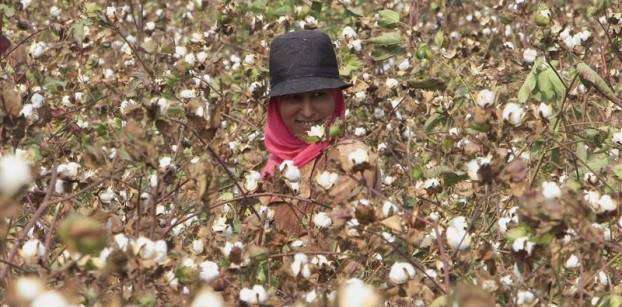Egypt's agricultural trade suffers from 'unorthodox' govt measures - U.S. report

A farmer during cotton harvest season . REUTERS
CAIRO, Jun 30 (Aswat Masriya) - Egypt spends cash it cannot afford and misses market opportunities for some key commodities leading to constantly increasing food costs, concluded a report by a U.S. government agency.
The report, which was published on Jun. 8 by the U.S. Department of Agriculture Foreign Agricultural Service (FAS), highlights that "unorthodox agricultural measures" cost Egypt over $800 million in direct costs and foregone export earnings. They further diminish much needed foreign exchange, distort trade, hinder private initiative and undermine innovation.
Various measures adopted by the Egyptian government were considered by the FAS as a stark variant from global trade rules and practices, including those imposed on wheat imports, grain and oilseed imports and cotton imports.
Wheat imports and the zero-ergot standard
Egypt has rejected several shipments of wheat from different countries since December 2015 for containing trace levels of the ergot fungus, a common grain fungus.
The measures came as the country's agriculture quarantine authority began to apply a zero-tolerance policy for ergot.
However, suppliers said the standard was impossible to meet and Egypt's Ministry of Supply and Agriculture later assured them they would follow a 0.05 percent-tolerance policy, which is a widely applied international standard.
"Zero tolerance for ergot puts Egypt out of step with the rest of the international trading community, and Egyptian consumers pay the price," the report stated.
The Egyptian government backtracked on the ergot standard after international markets had reacted swiftly to the quarantine authority's actions, the report added.
A decree overturning an old agricultural quarantine law that stipulates zero ergot has yet to be issued because of a months-old judicial order from the prosecution banning all ergot from entering the country, Reuters reported.
The FAS estimated that this measure would cost Egypt between $55-82.5 million in 2016. The figure does not include legal costs likely to be incurred as Egypt faces a multimillion dollar lawsuit brought by the trading company, whose wheat was rejected due to breach of contract.
Ban on rice exports
The FAS said that Egypt's trade policy concerning rice "curtails exporters' ability to conduct business," despite having a surplus production of the crop.
With an export ban currently in place to maintain adequate domestic supply at reasonable prices, rice producers and traders have held on to their stocks in an effort to force the government to lift the ban, the report mentioned.
However, the main state grain importer General Authority for Supply Commodities (GASC) refused to lift the ban and attempted to purchase imported rice, but did not succeed due to higher-than-expected prices.
Meanwhile, Egypt's water and irrigation minister was quoted as saying that the area where rice is planted is expected to increase in 2016 beyond the allowable area set by the government, another FAS report stated.
The FAS believes that if Egypt "allowed the market to work its course," it would be able to export larger amounts of wheat and garner desperately needed foreign currency. According to the report, Egypt foregoes close to $500 million in foreign currency due to missed export opportunities.
Burdensome cotton import regulations
The FAS viewed Egypt's "ad-hoc import bans" on cotton, evident in the lack of consistency in issuing import permits, as a measure that disrupts the textile industry's supply chain operations. This occurs at a time when domestic production is unable to meet the textile industry's demand.
A larger-than-expected drop happened in the cultivated area of cotton during the 2016/ 2017 season, reaching 50 per cent, FAS said.
Egypt is known for its extra-long and long-staple cotton that is unsuitable for many textile operations as these rely on short- and medium-staple varieties. This pushes the industry towards paying a significant premium for inferior or unsuitable cotton varieties, according to the report.
Cotton production is made up of about 90 per cent extra-long and long-staple cotton, while 10 per cent are short and medium staple varieties, the report added.
The report further alluded to Egypt's "unpredictable cotton policy and unique phytosanitary requirements," arguing that it creates a burden on the textile industry.
Egypt is the only country requiring double fumigation, a method of pest control, both at the country of origin and at the port of arrival, FAS says. "In 2016, this measure will cost Egypt’s textile industry an additional $3.0 to $5.5 million."
The ministerial decision to increase rice plantations amid an increase in prices of certain types of rice would encourage many cotton farmers to shift their production to rice, FAS said.
FAS "links U.S. agriculture to the world to enhance export opportunities and global food security." FAS has a global network of 93 offices covering 171 countries.









facebook comments